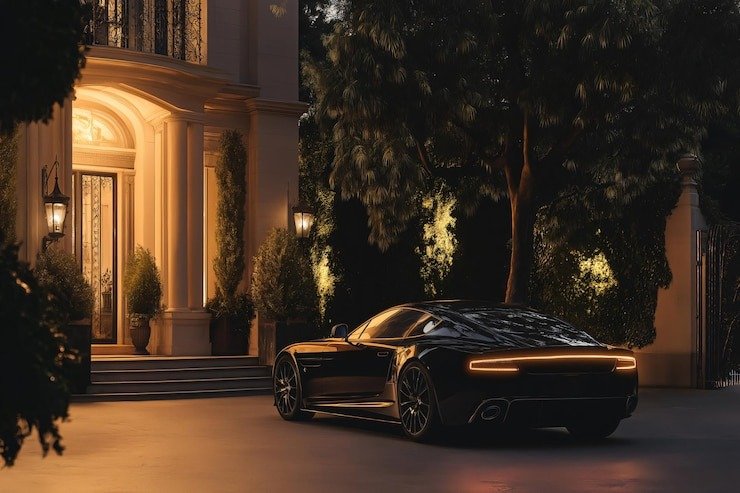The Allure of Luxury Cars
Luxury cars are more than mere modes of transportation; they are embodiments of sophistication, status, and an appreciation for exquisite craftsmanship. The allure of these vehicles lies in their ability to evoke an aura of prestige, distinguishing their owners within society. The hallmark of luxury cars is found in their exceptional design and the intricate details that set them apart from standard automobiles.
One of the key features defining luxury cars is the bespoke interiors that provide a personalized driving experience. High-quality materials such as fine leather, polished wood, and premium metals are meticulously crafted to create an environment that exudes comfort and elegance. Each component is thoughtfully chosen to ensure that every detail reflects a commitment to excellence. Additionally, many luxury cars offer customizable options, allowing buyers to tailor the vehicle’s interior to their precise tastes, further enhancing the vehicle’s exclusivity.
Equipped with cutting-edge technology, luxury cars often lead the way in automotive innovation. Advanced infotainment systems, driver-assistance features, and high-performance engines are just a few examples of how these vehicles integrate modern technology to enhance both safety and enjoyment. With features such as adaptive cruise control, augmented reality displays, and seamless smartphone integration, luxury cars embody the intersection of performance and convenience, catering to discerning consumers who demand the finest in their driving experience.
Moreover, the branding associated with luxury car manufacturers contributes significantly to their allure. Renowned brands have cultivated a prestigious image over decades, establishing a reputation for excellence that resonates with consumers. The symbolism of owning a luxury car often conveys success and a refined lifestyle, making these vehicles highly desirable to those who value both performance and prestige. In essence, luxury cars represent a blend of superior engineering, unparalleled comfort, and a statement of taste that consistently appeals to automotive enthusiasts and status seekers alike.
Engineering Excellence: The Heart of Luxury Cars
The world of luxury automobiles is characterized by a remarkable blend of engineering precision and aesthetic appeal. At the core of these high-end vehicles lies a sophisticated assembly of components that work in unison to deliver an unparalleled driving experience. Powerful engines serve as the heart of luxury cars, offering robust performance while maintaining smooth operation. These engines are typically crafted using premium materials and cutting-edge technology, providing the perfect balance of horsepower and efficiency. Examples abound with leading brands such as Mercedes-Benz, BMW, and Aston Martin developing turbocharged engines that deliver dynamic acceleration and optimized fuel consumption.
In addition to the impressive powertrains, luxury cars are equipped with advanced suspension systems that ensure optimal ride quality. These systems may utilize adaptive dampers and air suspension technology, allowing vehicles to adjust to varying driving conditions dynamically. Such innovations not only enhance comfort but also improve handling, enabling drivers to experience superior stability and control. The seamless integration of engineering and design is where luxury vehicles truly excel; the attention to detail ensures that elements such as noise reduction, vibration control, and steering responsiveness are consistently refined.
Modern luxury cars also leverage innovative technologies to elevate safety and driving experience. Features such as adaptive cruise control, lane-keeping assistance, and advanced collision-avoidance systems are increasingly becoming standard. These technologies enhance both driver confidence and passenger safety, reinforcing the reputation of luxury models as not only powerful but remarkably safe. Furthermore, efficiency is paramount, with many manufacturers investing heavily in hybrid and electric technologies that reduce the carbon footprint while maintaining the performance luxury drivers expect.
Ultimately, the intricate processes behind the construction and refinement of luxury automobiles highlight a commitment to engineering excellence. The investment in superior quality and continuous technological advancements allows these vehicles to offer an extraordinary experience, ensuring they remain a symbol of prestige and performance in the automotive world.
Iconic Brands: A Legacy of Distinction
The automotive industry is adorned with numerous brands that have not only defined luxury but also established legacies that resonate through generations. Among these, Rolls-Royce stands as a paragon of opulence and craftsmanship. Founded in 1904, the brand has consistently managed to strike a balance between technology and artistry. Signature models like the Rolls-Royce Phantom showcase the meticulous attention to detail and bespoke options that allow owners to tailor their vehicles to personal specifications. This commitment to individuality has cemented Rolls-Royce’s position as a benchmark in luxury automotive heritage.
Bentley, another esteemed name, carries the torch of British elegance with a history dating back to 1919. The brand is heralded for its blend of performance and luxury, evident in models such as the Bentley Continental GT. This vehicle, characterized by its superior engineering and lavish interiors, appeals not only to car enthusiasts but also to those who desire a lifestyle synonymous with status and sophistication. Bentley continues to innovate, integrating cutting-edge technology with traditional craftsmanship, thus maintaining its prestigious reputation.
Equally iconic is Lamborghini, renowned for its bold designs and high-performance supercars. Established in 1963, Lamborghini revolutionized the sports car segment with models like the Miura and the Aventador. These vehicles embody a spirit of relentless speed and audacity, capturing the imagination of car aficionados around the world. The brand’s emphasis on dramatic aesthetics and powerful engines has contributed to its cult status among luxury vehicle manufacturers.
Finally, Ferrari stands out not only for its speed but also as a symbol of exclusivity and exhilaration. Founded in 1939, Ferrari has become synonymous with racing heritage, with successful models like the Ferrari 488 GTB pushing the boundaries of performance. Each Ferrari is meticulously crafted, ensuring that each car is as unique as the individual who drives it. This association with high-speed achievements and luxurious imagery positions Ferrari firmly as a leader in the luxury automotive industry.
These iconic brands serve as pillars of the luxury automotive sector, offering vehicles that transcend mere transportation. Their rich histories, signature models, and constant innovation have significantly shaped consumer preferences and defined what luxury truly means in the automotive world.
The Future of Luxury Cars: Trends and Innovations
The luxury automotive sector is undergoing a profound transformation driven by lifestyle changes, technological advancements, and shifting consumer expectations. One of the most prominent trends is the increasing adoption of electric vehicles (EVs). Luxury car manufacturers are investing significantly in EV technology, recognizing the importance of sustainability in modern consumer preferences. High-performance electric models showcase not only eco-friendliness but also exceptional capabilities that compete with traditional combustion engines. Brands such as Tesla, Porsche, and Mercedes-Benz are leading this evolution, offering luxury that aligns with environmental consciousness.
Alongside electrification, the integration of autonomous driving technologies is shaping the future of luxury vehicles. Innovations in artificial intelligence and machine learning are paving the way for advanced driver assistance systems that enhance safety and convenience. As these technologies mature, luxury brands are exploring fully autonomous driving options, offering a new paradigm of comfort and leisure for drivers and passengers alike. This shift allows consumers to redefine their relationship with driving, prioritizing relaxation and productivity over traditional control.
Sustainability does not stop at propulsion; luxury brands are also re-evaluating the materials used in vehicle production. An increasing number of companies are incorporating recycled and eco-friendly materials, providing not only physical comfort but also an ethical appeal. Natural leather alternatives, biodegradable composites, and renewable resources are being embraced to create a more sustainable luxury experience.
Moreover, as technology continues to advance, luxury car buyers expect enhanced connectivity and personalization. In-car digital ecosystems are evolving to include seamless integration with personal devices, real-time data sharing, and customizable interfaces. This shift ensures that the luxury experience extends beyond the vehicle’s aesthetics, offering tailored services and functionalities that resonate with the individual’s lifestyle.
In summary, the future of luxury cars is characterized by a commitment to sustainability, technological innovation, and personalized experiences. As these trends unfold, luxury vehicles will continue to exemplify sophistication while addressing contemporary environmental and social concerns.


No responses yet